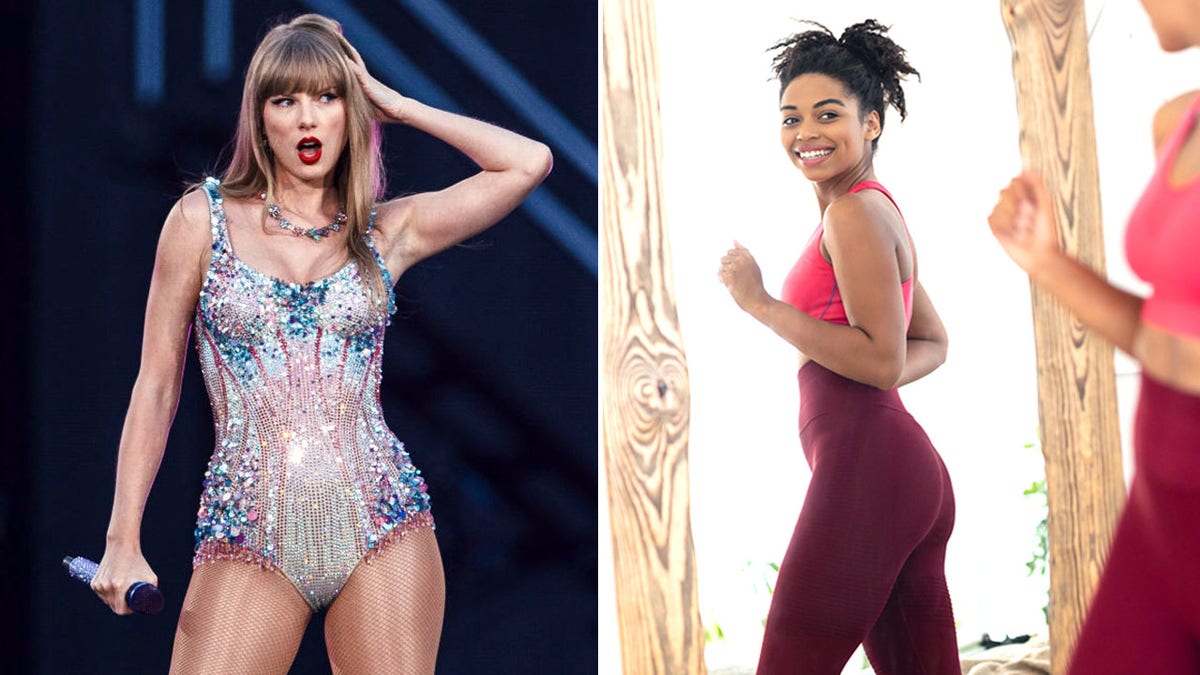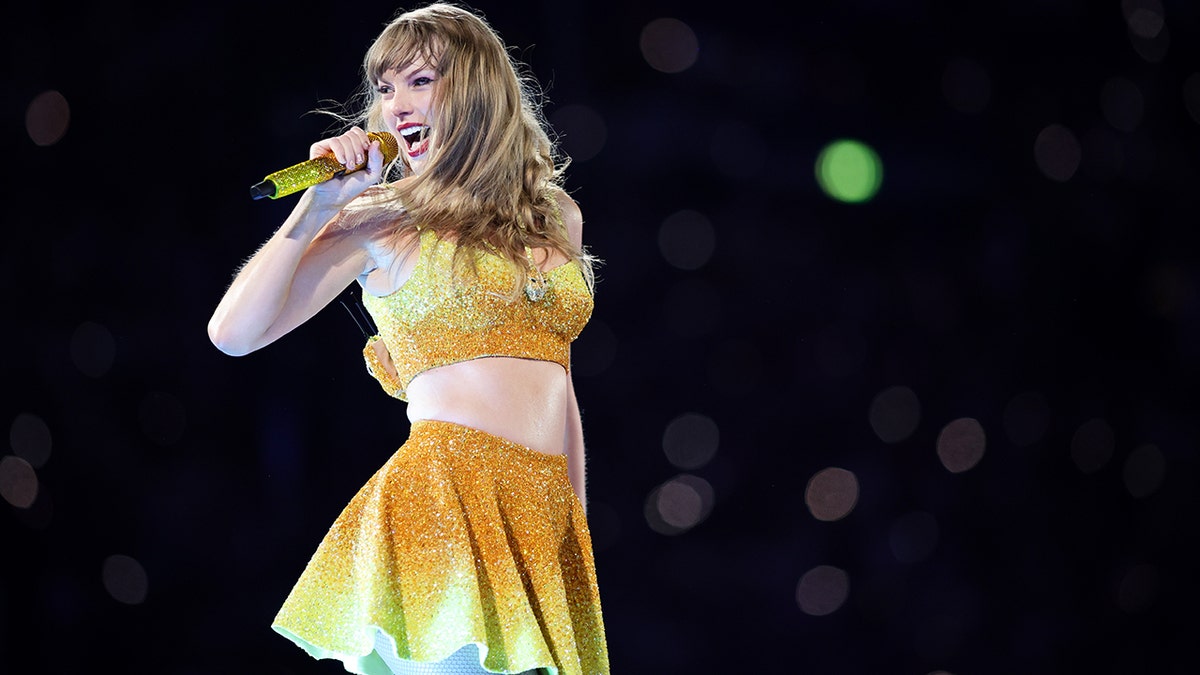Pop star Taylor Swift has helped her fans achieve a more positive outlook overall on diet culture, disordered eating and body image, according to a new study from the University of Vermont.
 The research, published in the journal Social Science and Medicine, surveyed hundreds of social media posts on TikTok and Reddit from Swift fans' remarks about eating disorders or body image.
The research, published in the journal Social Science and Medicine, surveyed hundreds of social media posts on TikTok and Reddit from Swift fans' remarks about eating disorders or body image.
The common themes included conversations about Swift as a role model for disordered eating recovery; the use of or identification with specific songs that mention struggles with eating or body image; and objectification of Swift’s body.
TAYLOR SWIFT SUPERFAN SPENT NEARLY $9K TO ATTEND 12 ERAS TOUR CONCERTS: ‘A BIG DEAL’
The study also examined conflicting reactions from fans on social media to a scene in Swift’s "Anti-Hero" music video that depicted the word "fat" on a scale.
Swift’s disclosure of her own struggles with eating and body image have had an overall positive influence on her fans with similar struggles, the researchers concluded.
Although it was difficult to decipher demographics from social media posts, the "general sense" was that most users were young adults, many on TikTok presenting as high school age or younger, a researcher said. (Getty Images; iStock)
Swift is considered "one of the most popular and influential celebrities" with "power as a role model for millions of fans across the world," the study findings stated.
THE TAYLOR SWIFT OBSESSION: PSYCHOLOGIST WEIGHS IN ON WHY FANS WORSHIP CELEBRITIES
Lead study researchers Lizzy Pope and Kelsey Rose discussed the findings with Fox News Digital.
Pope, an associate professor of nutrition and food sciences at the University of Vermont, said she recognized the admiration many of her students have for Swift.

Taylor Swift performs onstage during "Taylor Swift | The Eras Tour" at Veltins Arena on July 17, 2024, in Gelsenkirchen, Germany. (Andreas Rentz/TAS24/Getty Images for TAS Rights Management)
In Swift’s 2020 documentary, "Miss Americana," the pop star spoke candidly about her eating disorder — which led Pope to wonder how such disclosures have impacted her fans.
She and Rose, a clinical assistant professor of nutrition and food sciences at the University of Vermont, began gathering qualitative data from social media to create a "code book" of common themes.
TAYLOR SWIFT QUIZ! HOW WELL DO YOU KNOW THE FAMOUS POP MUSICIAN?
The researchers found that Swift seemed to be a role model for those dealing with disordered eating.
"People would have really vulnerable, honest reflections on how her work, or her disclosure, had helped them through disordered eating of their own," Pope said.

Two Taylor Swift fans pose for a selfie in the city center during the pop singer's concert at the nearby Veltins Arena on July 17, 2024, in Gelsenkirchen, Germany. (Hesham Elsherif/Getty Images)
Swift also appeared to help decrease the stigma around disordered eating and make it more acceptable to seek treatment, according to the researchers.
Despite the overall positive effects, however, Pope noted that many fans still "persistently objectified" Swift’s body online.
Pope also called the "fat scale" in Swift’s "Anti-Hero" music video an "artistic choice," although some people claimed that it showed "anti-fat bias."
"Other people thought it was just her experience as someone with an eating disorder who has body dysmorphia and sees her objectively thin body as fat," she said.
(Swift has since removed this scene from the video, in response to critics who considered it "harmful," Pope said.)

Taylor Swift and Lana Wilson are shown speaking onstage during the Netflix premiere of "Miss Americana" at Sundance Film Festival on Jan. 23, 2020, in Park City, Utah. (Kevin Mazur/Getty Images for Netfilx)
Given Swift's "vulnerability and honesty," Rose pointed out the "profound impact" the singer has had on society.
"A strong female figure in the celebrity world can have a huge impact on our culture and the well-being of our citizens," she said.
AS EATING DISORDERS INCREASE AMONG COLLEGE STUDENTS, HERE'S HOW PARENTS CAN HELP

Eating disorders have risen since the pandemic began, particularly among teens and young adults, Pope pointed out.
"So, maybe there's an untapped public health potential to partner with celebrities who have had these types of experiences and are willing to be vulnerable and … change the way we think about bodies, eating and what it means to be healthy," she suggested.
Warning on ‘potential detriment'
Dr. Andrea Vazzana, a psychologist specializing in the treatment of eating disorders at NYU Langone in New York City, reacted to the study findings in an interview with Fox News Digital. She was not involved in the research.
Vazzana pointed out that Swift has driven people to action in other areas, from voting to attending football games and making friendship bracelets.

Taylor Swift performs onstage during "Taylor Swift | The Eras Tour" at Veltins Arena on July 17, 2024, in Gelsenkirchen, Germany. (Andreas Rentz/TAS24/Getty Images for TAS Rights Management)
The pop star's influence on disordered eating, however, could be a "potential detriment," Vazzana warned.
In her 2020 documentary, "Taylor appeared to advocate for body acceptance and against behaviors that sabotage one’s body image and physical or emotional health," she said.
‘GIRL DINNERS’ SOCIAL MEDIA TREND SPARKS CONCERN AMONG EXPERTS: ‘UNHEALTHY OBSESSION’

"She spoke of the futility of trying to meet societal beauty standards – in part because beauty is in the eye of the beholder and in part because of the incompatibility of meeting multiple standards simultaneously."
Vazzana, however, said she considers this self-disclosure to be "flawed in several ways."

"A strong female figure in the celebrity world can have a huge impact on our culture and the well-being of our citizens," one of the researchers said. (iStock)
"Some people will view Taylor as a role model of vitality," she said.
"On the other hand, those fans [who are] susceptible to body dissatisfaction and eating disorders are likely to scour her words for tips on how she lost weight and ways that she now maintains what most would consider an enviable physique."
Swift’s disclosure addresses "weight-loss methods, timelines, social reinforcers and excuses [given to] concerned individuals," the psychologist added.
CLICK HERE TO SIGN UP FOR OUR LIFESTYLE NEWSLETTER
There is a risk that fans might try to "emulate her exercise and restrictive eating habits, despite her disavowal of them," Vazzana said.
Swift also shared her clothing size at her current weight and at her thinnest, the expert noted, which could spark comparisons or even self-loathing among fans, Vazzana also said.

Swift's disclosure of details about her disordered eating could pose a risk for some fans, one psychologist warned. (iStock)
"Multiple well-controlled quantitative research studies have demonstrated the negative impact of comparing one’s appearance with celebrities who promote thinness, with stronger parasocial relationships and celebrity worship magnifying that impact."
Vazzana also called out potential limitations of the study.
"Data was sourced from a self-selected population of individuals who were like-minded in their choice of social media and their Swiftie fandom," she said.
AI DEFINES ‘IDEAL BODY TYPE’ PER SOCIAL MEDIA – HERE'S WHAT IT LOOKS LIKE
"Swifties are a notoriously cohesive and loyal group of supporters."
So these fans may be less likely to disagree with the core group of posters to avoid any backlash, Vazzana noted.
The posts were also not randomly selected, she added, which could introduce a "potential source of bias."

Fans attend "Taylor Swift | The Eras Tour" at Empower Field At Mile High on July 14, 2023 in Denver, Colorado. (Tom Cooper/TAS23/Getty Images for TAS Rights Management)
Rose responded to Vazzana’s comments in an email exchange with Fox News Digital.
"While [Vazzana] hypothesized that Taylor’s disclosure would have a negative impact based on previous research, our outcomes show the opposite, which is why the findings were unique," she said.
"We didn’t intend to find that Taylor Swift had helped so many individuals with eating disorders, but that is what the data showed."
For more Lifestyle articles, visit www.foxnews/lifestyle
Rose added, "Unfortunately, individuals with eating disorders can always misuse information, but that was not what our research study was about, nor what we saw in the content."
In conducting the study, Rose said, the researchers looked at a community "defined as neutral" and searched content related to specific keywords and themes.
"Therefore, randomly selecting posts would not have been thorough and would have the potential to leave room for bias," she said.

